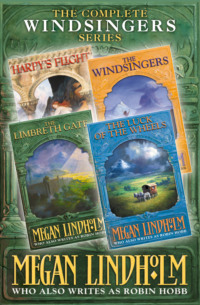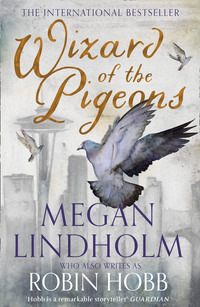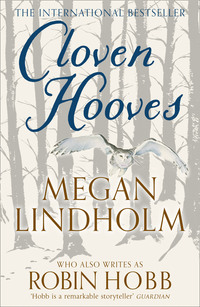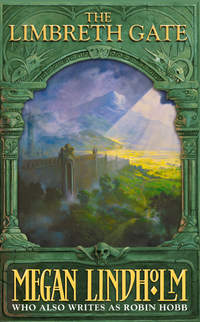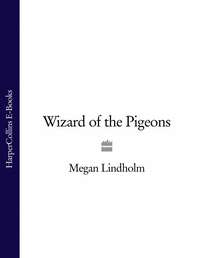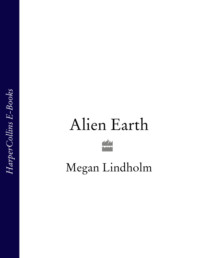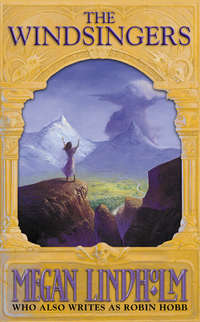
Полная версия
The Reindeer People
‘Aren’t you going to start the fire?’ Kerlew demanded petulantly. He tugged at the covers she had pulled away. ‘It’s getting colder and I’m hungry. Is that all you killed today?’
The old rage, the rage she had thought left behind with his baby years, rose in her. The unfairness of this burden chafed and burned her soul. She towered over him, her anger giving her strength. With one hand she seized his shirt front, dragged him from the blankets to his feet. She all but threw him at the cold hearth stones. He staggered sideways, caught his balance awkwardly, and then suddenly crouched down, cowering before her.
‘No!’ The word ripped her throat. ‘No! I am not going to fix the fire! You are! You, the fool that let it go out! Even the youngest babe of Benu’s folk knows that the fire must be always tended. Without the fire we cannot live! But you, old enough to hunt, if you were not so stupid, you let the fire go out while you huddle like a baby and fondle some stupid rock. Give me that thing!’
She wrenched the reddish stone, polished by Kerlew’s touch, from his frantic grip and flung it through the tent door. Kerlew’s face went white. The stone vanished into the snow and Kerlew cried out. He dove after it, but she caught him by the back of his shirt and dragged him back, to dump him roughly on the cold earth by the hearth. She was shaking with rage and despair. This was her son, her boy who would soon be a man? This crouching creature that wept with anger because she had thrown a stone from the tent? It was unbearable.
‘I want my rock!’ he screamed furiously. He tried to rise from his place by the hearth, but she shoved him back. She snatched down the leather bag that held the dry tinder high above the earth floor. She flung it at him. The boy cried out as the bag slapped him and fell to the floor. She followed it with the fire-bow. She had no flint and strike-stone.
‘Make the fire!’ she commanded in a voice that shook the tent. ‘Now!’
‘I can’t. I don’t know how. I want my rock!’ He scrabbled away, but she seized him by the scruff of his shirt and dragged him back. Tears streaked his face.
‘You try. Now. You’ve seen me do it a thousand times. Now you try. Now!’
‘I can’t! I can’t! I want my rock! It was my rock, not yours.’ There was fear in his voice as well as defiance, and any other time it would have melted Tillu’s anger. But she was too cold, too hungry, and too tired of being the entire support of his world. She knelt behind him and seized his thin wrists, forced his hands to the tools. His hands were limp. He would not pick them up.
‘Pick them up! Right now, Kerlew! You pick them up and you try! Do you think I will always be here for you, to come home and make the fires and cook the food? What if I had gotten lost today? What if a bear had killed me, or I had fallen and broken a leg? Would you sit in this tent and cry, “I can’t!” until you froze or starved? Would you? Would you sit and stroke a rock until you died? Would you? What if I hadn’t come back today?’
The boy craned his neck to look over his shoulder at her. His mouth hung open and his closely set eyes goggled at her in terror. ‘Not come back? You not come back? Kerlew alone?’ His fear had reverted him to babyishness. His mouth hung askew, his bottom lip trembling wetly as he stared at her in mindless fear. Tillu was ruthless.
‘That’s right. Tillu not come back. Now you try. Try!’
The boy took up the implements awkwardly, waved them about helplessly, and then tried to fit them together. She held her anger as he made three faltering tries, then slapped his hands aside. ‘Fool! Like this. Your top hand here, like this. Your other hand here, on the bow. Try!’
He shrank from her touch, but she seized him roughly and put his hands in place. He moved the bow awkwardly, his hand bent in toward his wrist as he sawed back and forth. The stick, trapped in the loop of the bow string, moved unevenly, dancing out of its nest, spending the heat of its friction as it skittered over the face of the wood. Tillu reached past him to set it firmly in place.
‘Try!’ she rebuked him again. There was no encouragement in her voice, only command.
‘Ma-a,’ he began pleading, but she jerked herself away from him, stalked to the door of the tent.
‘Call me when you have fire.’
Despair was on his face, his breath coming in short sobs, but she lifted the tent flap and went out into the darkness.
The cold of a subarctic winter night snapped against her flushed cheeks. It made her realize she was sweating, that her anger had put heat back in her body. She trembled still with the force of her fury. Why did he always do these things? Why?
Then, as her anger died in the cold blackness of the night, shame came to warm her cheeks. She could hear the steady rasp of the fire drill from the tent behind her, and Kerlew’s voice as he sobbed and ranted to himself. The world loomed large and empty around her, but there was nowhere she could flee to escape that small mumbling voice and the angry confusion in his eyes. Tillu’s angers seldom left Kerlew repentant for his misdeeds. Instead, he would offer her his childish sullenness, and the wincing fear of her touch that cut her soul.
She had pitched her tent in a clearing in a small vale. At the edges of the clearing the forested hillsides rose. Pines were darker in the darkness, their swoops of branches laden with snow. Sometimes she felt a deep peace welling from the trees and snowy hills, felt cupped and sheltered in the palm of the forest. She heard the soft whicker of an owl’s wings as it drove into the clearing, the thin cry of the seized prey as it rose. The sound scraped her raw nerves and she shuddered. Tonight she sensed only the deep and eternal struggling of life to master its harsh environment. The most blind of newborn mice was better fit to survive than her son. Why could not she admit the futility of trying to make him learn? Kinder by far to let him go on as he was, until he met his eventual end. What good did she do him by forcing him to learn, by throwing him into the struggle and insisting he try?
He was as he was. Beating him would not cure it, as well she should know by now. Neither her tears nor her pleading had any effect. He was as he was. The most she could do for him was to let him take what small pleasures he could find in this world, and to bury him when he had finally blundered his way out of it. But what she was doing to him tonight was no better than beating him. Hadn’t he had enough punishment in his life? Had not other children and sneering adults given him enough misery to last him until the end of his days? Her heart swung in its orbit, and she felt her anger rise against those who mocked his differences, who pointed out his lacks. Who were they to judge? Who were they to say that what made him different also made him wrong and weak? Her anger burned hot at the women who shook their heads over him and turned away, at the men who looked at him with distaste and cuffed him aside. And she herself? She was no better.
She thought of his red stone and shame stung her. Futilely she turned to where it had landed. Whatever dent it had made in the snow cover when it landed was hidden from her in the dark. She stood indecisively by the area for a long time. She longed to get down on her knees and paw through the snow for the rock, as if this useless endeavor would somehow prove her love for Kerlew.
Tears stung the corners of her eyes and she brushed at them with the back of her mittened hand. Tomorrow, she promised herself. Tomorrow, when the day was lightest, she’d come out here and find it for him. And now she had better go back inside the tent and make the fire and cook some food.
The surging storm of anger and frustration had passed, leaving her feeling only empty and tired. Vaguely she wished she had hugged him more when he was a baby, cuddled him more. But the thought brought back the memory of his small body rigid in her arms, his infant face red as he fought her embrace. She remembered the painful thudding as he banged his over-large head against her bony adolescent chest, over and over again, battering her with it as she carried him so that by nightfall both his face and her breasts were black-and-blue. When she had put him down, he screamed. When she picked him up, he went rigid. But perhaps she could have tried harder. Maybe if her mother or aunt had been there, someone could have told her what she was doing wrong.
But they hadn’t. She wondered if they had even survived. The raiders had carried her far from her home on the river. When her swelling pregnancy made her an unattractive bed partner, they had abandoned her, with less thought than they had given to abandoning a lamed horse. She had never even known which of them had fathered the boy. When she thought of them now, she could not even remember them as individuals. Their coarse black hair and sallow faces blended into one nightmare of a smelly, heavy male pinning her down and hurting her. Trapping her against the rocky earth, all hot breath in her face and heavy weight on her torso and laughter all around as she struggled. She jerked her mind from the memory, shuddering.
She was shaking, she realized suddenly, shaking with the deep tremors that were the body’s last effort against cold. She had stood still too long, and the night had sucked her warmth away. She had to have fire and warmth now, if she were to live. And she had to live, if Kerlew were to live. She turned to the tent wearily. She would take the bow and make the fire. She would take up once more the weight of their survival. Then from the tent she heard his shrill voice cut the night and the cold, his triumph ringing brighter than the stars.
‘Fire! Tillu, Tillu, it burns, it burns for me!’
CHAPTER FIVE
Cold air moving against her face. As cold as it would be outside, not inside, the tent. Tillu released her grip on sleep and stirred slightly beneath the hides that covered her. Had the fire gone out? She dragged her eyes open and peered out from her huddle of skins. No, the fire was still aglow, though it would need more fuel soon. The draft came from the open tent flap, where Kerlew stood in his long nightshirt, staring out into the darkness. ‘The wood is right by your left foot,’ Tillu pointed out. ‘You don’t need to chill the whole tent to find it.’
‘Not looking for wood,’ Kerlew mumbled. Cold air flowed in past him, misting slightly as it met the warmer air inside the tent. Kerlew stood motionless in the swirling fog as it eddied past him.
‘Well, put some on the fire anyway,’ Tillu instructed him grouchily. She pulled the hides up to her chin again. Kerlew still stood in the doorway, staring out into the snowbound darkness.
‘I heard Carp.’ He swayed slightly, as if he were still asleep. ‘Calling me.’
A chill ran over Tillu and the hair on the back of her neck hackled. Stupid! she chided herself for her reaction. But there was something in the boy’s slow words and unseeing gaze that spooked her. In the dim light from the dying fire, he turned his face to her. His eyes were black holes beneath the straggle of his hair, no trace of sleep in them. His intentness reminded her of a great wolf sitting, ears pricked, as his prey moved into his range. Not for the first time, she said, ‘Carp isn’t coming, Kerlew. You dreamed it.’
‘I know.’ The boy spoke in his hesitant way, as if each word had to be found before it could be uttered. He strung his words on the threads of his thoughts, visibly manufacturing his sentences. ‘But it was one of the real dreams, like he taught me. I saw Carp, walking through the snow of the forest.’ Wonder transformed the boy’s face. ‘He looked up at me and smiled so I could see where his teeth are gone. He was leaning on the staff we carved together. And I knew he was coming for me. He said, “You are mine, Kerlew. And I will come for you, because the spirits will it. Be patient, but do not forget.” Then it started snowing and it fell between us until everything was white and I couldn’t see him anymore. But I thought I heard him calling me, so I woke up and got out of bed to see.’
‘Kerlew.’ Tillu kept rigid control of her voice. ‘Carp is not coming for you. He doesn’t know where we are. And we have come a very long way since we left Benu’s people. They don’t come this far west. We are out of their territory now. I don’t think we will ever see Carp again.’
Kerlew stood silent, his brow crinkled, nodding slowly. Then he let the tent flap fall, shutting out the night and the greater darkness it sheltered. The tent became a small, safe place again, and Tillu could look at Kerlew and see her child. His bare legs stuck out from under his soft leather nightshirt. His thick black hair was tousled, some dangling before his strange eyes. For an instant she saw all his vulnerability and loneliness, and her conscience smote her. In all her travels, Carp was the only adult male who had ever shown anything near tolerance for her son. To some, Kerlew was an object of ridicule; to others, disgust. He had always been taunted by other children, ever since he was old enough to betray his differences with speech. Women either pitied him and treated him as a babe, or pitied Tillu and treated him as a misfortune. In running away from Benu’s folk, she had taken him from the only person who had ever befriended him.
‘Then why did he say he was coming?’
Tillu tried to keep her patience before the slow words of the dogged questions. ‘Because you only dreamed it. He didn’t really say it.’
He stood nodding by the fire, his mouth slightly agape, his tongue wetting his lower lip. Then his lips moved as he carefully repeated her words to himself. ‘Ah,’ he said, nodding at the flames. ‘A dream.’
Tillu sighed in relief and began to settle back into her nest of hides.
‘Do you think Carp will come tomorrow, then?’ Kerlew’s hopeful question jerked her back.
Tillu sighed. ‘No. Carp won’t come tomorrow, either. You never hear a word I say, do you? Bring in some wood for the fire.’
He stooped to obey her, dragging in sticks of wood frosted with last night’s snowfall. They sizzled as he dumped them clumsily onto the red coals.
‘Not too many at once,’ Tilly cautioned him. ‘You’ll put it out.’
‘Then I’d have to start it again,’ Kerlew observed, an edge of resentment showing in his slow-spaced words.
‘That’s right,’ she agreed firmly.
They both fell silent, feeling the silent tension hanging between them. Part of her said it had been necessary, that the boy had to learn, however he could be taught. Part of her felt only sickened and sad. How well he remembered anger and hurt. He might forget what she had said to him moments ago, but his memory of last month’s confrontation was still fresh. It was how his mind worked. As if he could sense the things that pained her and chose to keep those things for himself.
She looked at him now, saw his eyes steal up to the tent support where the meat hung. She smiled at him slowly, remembering his face shining with the triumph of fire. That she would keep for herself. He stared back at her, then smiled uncertainly.
‘It’s nearly time to get up, I think. Shall I bring snow?’ he offered hopefully. Then Tillu knew what had really awakened him. He was hungry.
She pushed wearily at her blankets. She knew she should make him go back to sleep and wait to eat until the true morning. But she felt guilty and, she realized, hungry herself. She was not providing well for them. She knew the forest offered ample food, even in the hardest winter, for the skilled hunter. But she was not skilled.
In the time since they had left Benu’s folk, she had been feeding them on rabbits and ptarmigan and the like. At first, there had been the dried meat and oil to supplement what she caught, and the late vegetation of autumn. But snow had locked the plants away now, save for bark teas and the like, and they were reduced to whatever meat she could bring home. Yesterday it had been two hares, neither of them large. She had stewed them up, reserving the hindquarters of one for breakfast. The little creatures had already lost their autumn fat. The lean, stringy meat had been more tantalizing than satisfying. She craved fat, and no amount of stringy hare could satisfy that craving.
She gave in to Kerlew with a curt nod. He snatched up the pot and ran to pack it with snow, not even bothering with his boots. Tillu pushed her sleeping fur back and dressed hastily in the chill of the tent. She added more fuel to the fire and set the pot of snow close by it to melt. The semifrozen hindquarters of the rabbit were hanging from one of the tent supports. She took them down, shaking her head at how small they were, and cut the meat into tiny bits that would cook quickly. Bones and all went into the pot. She poked at the fire to bare the coals and set the pot among them, screwing it into place to brace it. Kerlew had dressed quickly. Now he picked up the bone knife she had used to cut up the meat and licked the traces of blood from it. Tillu chided him: ‘Don’t cut your tongue.’
‘I’m careful,’ he told her and ran his fingers over the piece of wood she had cut the meat on, licking them eagerly. His hunger and the crudeness of their surroundings struck her suddenly. Shame vied with anger, but weariness won over both of them. If she didn’t start doing better, they weren’t going to last out the winter. She stirred the pot of stew thoughtfully. Everything they had was on the verge of wearing out. The bone knife needed to be replaced, mittens needed sewing, the small scraped hides of her kills needed to be worked into useful leather. But there was only one of her and most of her time was taken up with hunting. The solution would have been simple with any other child: Put the boy to work. But experience had taught her that teaching Kerlew a new skill took more time than doing it herself.
Still. He had relit the fire. And he had been responsible for gathering the wood since then, without being reminded. Maybe the harshness of the fire lesson was what he had needed. Maybe it was time to expect – no, demand more of him.
He had come to hunker beside her, watching like a camp-robber bird as she stirred the stew. The water was beginning to warm, and she could smell the meat cooking. She added a handful of dried ground lichen to thicken it. Kerlew’s nose twitched and he sighed in anticipation as he crouched beside her. Sitting down flat on the cold earth floor of the tent, he leaned against her, taking comfort in her closeness and warmth as if he were a much younger child. Tillu reached to rumple his hair. He flinched, then looked up at her questioningly.
‘Kerlew. We can do better than this, but only if we both try harder. I need you to learn to do more things, make more things for us.’
His wide eyes looked up at her in alarm. ‘I brought the firewood yesterday.’
‘I know. I know. You’ve been very good about remembering to do the things I asked you to do. But you’re big now, and it’s time you started to do even more things. I could show you how to stretch the rabbit hides, and you could learn how to fix your own mittens, and –’
His lip jutted out rebelliously. ‘No. That’s women’s work. Carp said so. I’m not supposed to do those things.’
Tillu clenched her teeth, biting back her anger. Carp. Always Carp. How far would she have to travel to escape that man? She began again carefully. ‘Different groups of people have different ways. We are on our own now, so we can make up our own ways. We can do any kind of work we want. And there are many kinds of work we are going to have to do if we are going to survive on our own. We can’t trade healing for meat and garments anymore. So I am going to have to sew our clothing for us, and hunt our food. Even though I never used to do those things. And you will have to do things you didn’t do before, either.’
Tillu paused to look at him. His brow was wrinkled, but his look of stubbornness had diminished slightly. He had pushed his lips out as he thought. It was a lesson that her years with Kerlew had taught her. Other children might be told firmly, or be persuaded with the threat of punishment. Kerlew would go unmoved by such tactics. As slow-witted as he seemed, he would not do a thing until he had firmly in mind the reasons why he must do it. Once persuaded, however, he would not be swayed from what he perceived as necessary. Such as the need to flee from bears, and to keep the fire burning.
‘So why can’t I hunt, then?’ he asked suddenly.
‘You don’t know how. I thought you would want to learn simple things first, like carving and making tools for us, while I hunted.’
‘Other boys my age hunt. Graado was always off hunting, before he died.’
‘I know. Graado was a very good hunter. But it had taken him a long time to learn. Now isn’t a good time for you to be learning to hunt, because if you accidentally miss, we won’t have anything to eat that night. But it is a good time for you to learn to make bowls and knives and other useful things. Do you see what I’m saying?’
‘Yes.’ Grudgingly. ‘I’d rather learn to hunt.’
‘You’ll learn to do both this winter,’ Tillu promised, surprised to find she meant it. Now, living alone with the boy, she could teach him some skills, both useful and social. Perhaps the next time they joined a group of people, his differences would not be so apparent.
‘It would be easier for you if we just found another group of people for you to heal.’ Kerlew spoke with insight Tillu had not known he possessed. She looked at him sharply.
‘What makes you say that?’ she demanded.
He shrugged stubbornly.
‘Well, it might be easier, but there’s no one around here for me to heal, Kerlew. So we’ll have to do for ourselves.’
He looked at her without speaking, not denying her words, but withholding his agreement. She sighed. He had made up his mind that there was another way to solve their problems. And he’d cling to his own solution for as long as he could.
‘Is it done now?’
She gave the meat soup another stir and nodded. He jumped up to fetch the carved wooden bowls, and to watch ravenously as she poured out their shares. They drank it in a companionable silence, Tillu thinking and Kerlew completely absorbed in eating.
It was finished too soon. Tillu rose to gather her supplies for the day. Taking up a soft leather pouch, she tied its sturdy belt around her waist. Into this went the bone knife, a long hank of braided sinew, and the smaller pouch that carried her healer’s supplies. Ever since her days on the riverbank when her great-aunt had first instructed her in the skills of a healer, she had carried such a pouch. In it were a few powdered herbs in bone vials and a roll of soft leather for bandages. Over all, she dragged on her heavy outer coat. It had been cured with the hollow-shafted hairs on it and, when new, they had trapped the heat and held it close. But reindeer hair was brittle, breaking off easily, and in places the coat was now rubbed nearly bare. As she often did, she wondered if the weight of the leather was worth the warmth. But she knew that if a storm came up, or if she were caught out overnight, she would be glad of it. The garment was a long-sleeved tunic that could be belted at the waist.
As she tugged up her mittens, she told Kerlew, ‘Today you should tend the fire and gather firewood, as much as you can. Pile up a lot so that you won’t have to go after wood tomorrow or the next day. And watch for pieces that might make a good bowl or spoon. Tonight, when I get back, we will try some carving.’
‘Can’t I go hunting with you today, so I can start to learn?’
Was he back to that idea again? ‘Tomorrow, maybe. When we have a good supply of wood, so we can bank the fire for the day. Remember, you have to gather lots of wood today if you want to hunt with me tomorrow.’ She took up her bow and paused. ‘Watch, too, for a piece of wood to make a bow for yourself. You’ll need one if you’re going to hunt.’
‘Shall I chant to the spirits to bring you good hunting?’ Kerlew offered cautiously. She could tell that he expected her usual snort of refusal at his offer. But what could it hurt?


